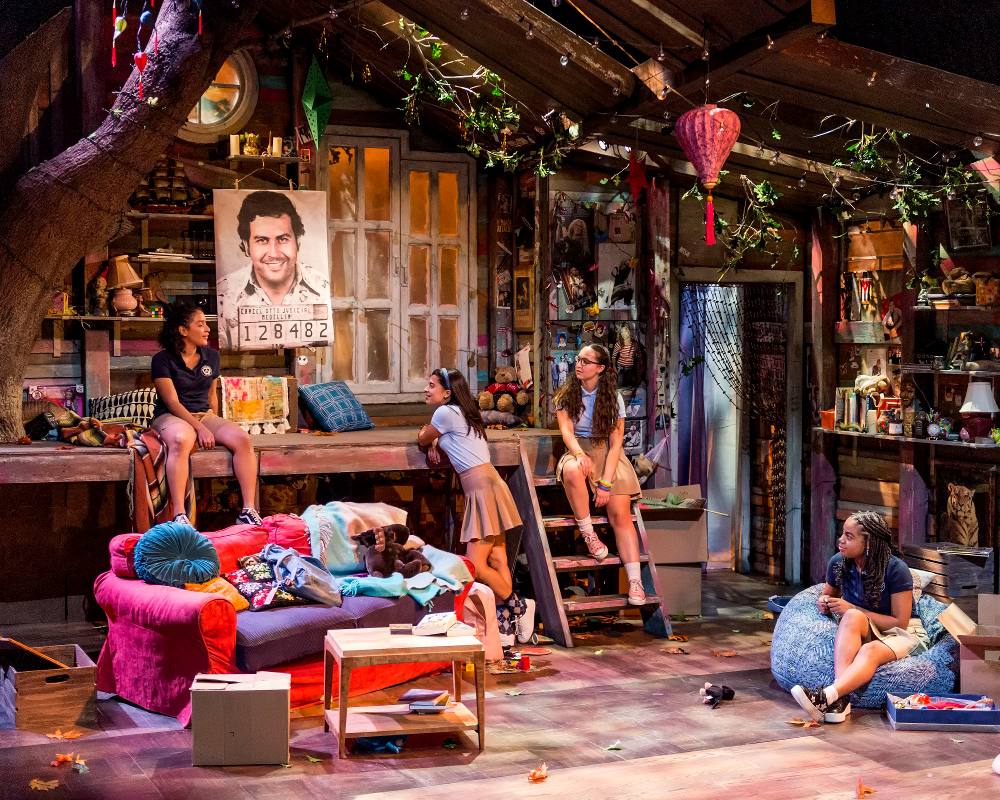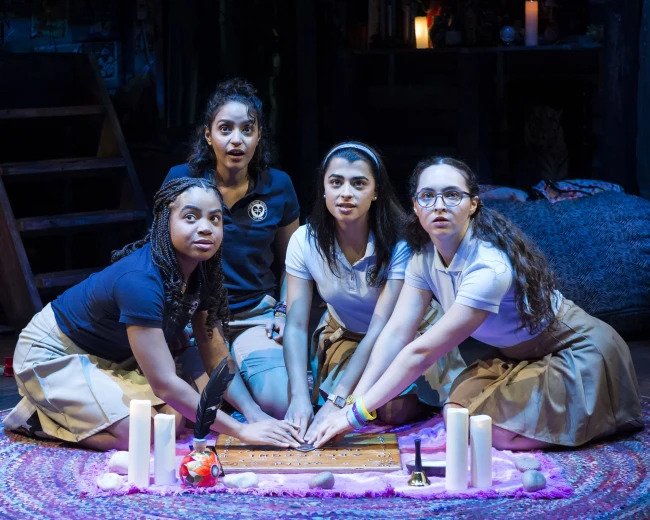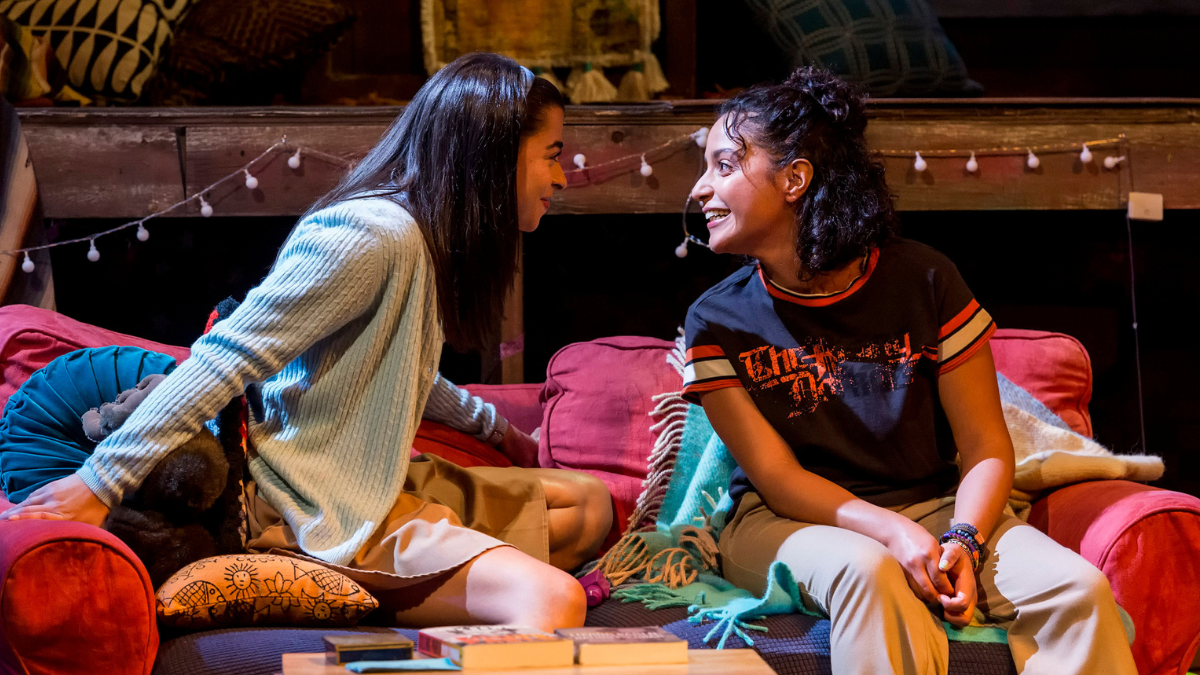By Cris Franco
Coral Peña is making her mark on both the big (The Post) and small screen (Blue Bloods, The Enemy Within and 24: Legacy). Her deep, truthful, and intelligent portrayals of a gay teen (Chemical Hearts) and an undocumented Mexican immigrant turned NASA engineer (For All Mankind) have distinguished Coral as more than just your standard Hollywood ingénue. This twenty-two-year-old has got talent!
Peña plays Kay in Our Dear Dead Drug Lord written by playwright Alexis Scheer and directed by Lindsay Allbaugh which runs from August 20th through September 17th of 2023 at the Kirk Douglas Theater in Culver City, CA.
In this fierce and feverish comedy from playwright Scheer, a gang of teenage girls gather in an abandoned treehouse to summon the ghost of Pablo Escobar. Are they messing with the actual spirit of the infamous cartel kingpin? Or are they really just messing with each other?
I had the pleasure of speaking with the spirited Ms. Peña during her lunch break while rehearsing for the role of Kay in the highly controversial new dramedy, Our Dear Dead Drug Lord playing from August 20th through September 17th of 2023 at the Kirk Douglas Theater in Culver City, CA. Ms. Peña enlightened us as to the upside to being of color, the power of proudly shedding tears, and why being a “messy” woman might be a good thing.
CRIS FRANCO (CF): I know you were born in the Dominican Republic but as a baby moved to Harlem, New York, where you and your older sister were raised by your single working mom. How do you think your childhood may have prepared you for the challenge of being an actor?
CORAL PENA (CP): Growing up in the projects, impoverished gave me a lot of curiosity and empathy. At a very young age, I’d observe different types of people in various, sometimes dire circumstances, and I’d wonder as to what in their lives led them to this condition. It impacted my view of the world. I’ve encountered privileged people who couldn’t possibly understand my difficult circumstances, but I feel that coming from a rough background gave me perspective.
CF: Do you think having to figure out how to survive in a tough world as a youngster may have helped you with character analysis? In so far as you had to figure people out?
CP: Yes, but it also allowed people to be kind and generous to me – and my family. My older sister was a brilliant student who got a full scholarship to an elite boarding school. I got in, too, on a scholarship. I got a wonderful education, and some of my classmates were well-off. If I’d pass on going out to dinner with them, they’d often say, “No problem, I can get it for you!” When the world shows you that kind of courtesy, you want to pay it back. Today, I’m very grateful for my background and want to be generous with the world.

CF: Past productions of your current project, Our Dear Dead Drug Lord have received lots of critical praise as well as some criticism for its breadth of scope addressing femininity, adolescence, and violence – to name a few of its themes. How would you describe the play?
CP: It’s hard. I’ve actually had quite a difficult time describing it because it does cover so many aspects of our world.
CF: Reviewers have even struggled to pin down its genre. Some labeled it a comedy.
CP: Well, yes, I’d say it’s a comedy – until it isn’t. Adolescent emotions are so exaggerated; that’s why they can be humorous. The world is so big, and teens are so small, that you’re stuck in your teenage bubble. If the play’s teenage girls’ language comes across as harsh, it’s because they lack the emotional tools to deal with their morphing into adults. Only once you mature are you able to reflect on your formative years and understand yourself. Understand how you came to be what you are at ages 30, 40, and 50. Realize, oh-my-gosh, that’s where I came from?! So that’s what I mean, just like adolescence, it’s a comedy until it isn’t.
CF: Tell us about your character.
CP: Kit is the new girl who moved to Miami from New Jersey in her senior year. She is the daughter of a single mother from a poor background who at age 17 is plopped into a clique of affluent girls. Kit’s background is so similar to mine that exploring her has been extremely therapeutic. Sort of unpacking and understanding the ways in which teenagers struggle to fit in and conceal their pain from each other. And how kids are also holding onto both their trauma and their parent’s trauma since they’re living in the same household as their parents. My character has a lot to unpack: she’s got a single mother who isn’t always doing a great job – and Kit’s gay. Very openly queer. Her life is both very funny and also very sad.
CF: Yes, some people have a lot to, as you said, “unpack.” Where is the play set?
CP: Florida. East Coast. In a very wealthy part of Miami around the year 2008 in September. Each of the four scenes takes place in a different month: September, October, and November, and the final act happens in December.
CF: And all the main girls are Latinas, right?
CP: Yes, my character is Colombian, one is Haitian/Puerto Rican, and the fourth is Jewish. So the girls have lots of different opinions. Especially when they begin discussing the 2008 election between Obama and McCain and socialism comes up. So, even though they’re all Latinx, they have a variety of perspectives.
CF: What’s it like working in an ensemble of primarily female actors?
CP: Not just the actors are female, but so are the director, playwright, stage managers, fight choreographer, and intimacy coordinator. Although gender is fluid, those who identify as female, are raised as women, or are treated as women are not scared or ashamed to emote their feelings. We don’t feel guilty about emoting, which is important in a creative space. We get into some pretty heavy material about how there is power in tears. Nothing embarrassing about it. We allow ourselves the freedom to cry and to share those deepest feelings. In a way, it’s been life-changing.
CF: How?
CP: There’s an expectation that people of color have to be strong because we fear deep down that if you crumble if you fall apart, there will be no one there to put you back together. To pick up the pieces. You are the only person holding yourself up. And that can be amazing. But that can also be really, really sad. And that’s one of the things we explore in this play, which is the lack of freedom that women of color feel to be messy and to be destructive because there are huge consequences. For example, I didn’t become a citizen until 2014. So, I was a goody-two-shoes and never got into trouble because the threat of deportation was over my head. I was not allowed to mess up. I saw my white peers doing drugs and alcohol. And there’s nothing wrong with that if that’s their own exploration. But I couldn’t, I couldn’t allow myself to get messy. I had to be good. And so one of the things we explore is like, what can happen if these women of color aren’t perfect? What if they get the opportunity to take up space and be messy? Just that exploration has been really liberating. It allows you to sort of breathe deeply and be a mess. Be human. That’s one of the reasons I really love this play.

CF: What is the message you’d like for audiences to take away from this Our Dear Dead Lord?
CP: Wow. There are so many messages. But I think the main one is that if women really tapped into their power, we’d be able to destroy the world. Society allows men to be really destructive. What does it mean that a woman can destroy the world? Is that negative, positive, good, or bad? Whichever, the ownership of that type of power is definitively liberating.
CF: I’ve always hoped that as women seized more real power globally, they’d help make the world more humanistic and caring.
CP: Of course. But this play talks about how men get power by way of guns fighting and money. While women’s power is within themselves, which is actually more powerful. These types of discoveries take place in the play.
CF: Do you feel that being an actor of color has impacted your career in a positive or negative way?
CP: Overall, positive. As a child, I was very focused on my community. In college, my white peers were much more individualistic, but my true joy is being an ensemble actor, being part of a bigger purpose, a bigger equation. And people of color hold so much power and strength and love and joy in the community. And so that’s something that I’m so grateful that I have access to. But that being said, this industry is predominantly controlled by white people, and sometimes it’s hard not to think that if you’re going up for a part against a white person, she’s already winning because they can already relate to her. When they close their eyes, they see her in the role. So, it’s up to me to not only have the skills they’re looking for but also to show that I have value. All my choices have to be intelligent. I have to show them that if you put me in this movie, it’ll make money. I have to answer for every single person of color before me. While white actors don’t have all that riding on them. They just get to be themselves in the room. They get to do their reading, and then they get to leave. But when I come into the room, I have to erase all their preconceived notions about what it means to be me. Only after I accomplish that am I allowed to act. So there’s a major disadvantage in not having people that understand your perspective being in the (audition) room with you.
CF: I know you’re a relatively young actor, but do you see things changing?
CP: Yes, little by little. I see more and more actors who not only look like me but also come from my same socioeconomic background.
CF: Yes, the impoverished are stereotyped and underrepresented while the wealthy are overrepresented in the media.
CP: And that’s a major disservice to the arts because if the voice of the arts is just the wealthy, then the stories we are telling are boring.
CF: Amen — oops! Your lunchtime is almost up. One last question. What do you think of the WGA and SAG strike?
CP: It’s not complicated. I think that the workers who make the product should be the ones benefiting the most from the product. There’s now a hoarding of wealth and not just in entertainment — UPS workers, hotel workers, auto workers are all striking or have considered striking to protest the hoarding at the top. It’s disgusting, and I have harsher words to say — words that you can’t print.
CF: I’m gonna print them anyway!
CP: The strike is not for the people who are making the most money; the strike is for the people who contribute so much to art and can’t pay their bills. I will be on strike for as long as it takes, I don’t want us to bend over backward and make any deals with the devil. I want us to fight and to get what we deserve!
To see the dynamic Coral Peña’s fiery artistic spirit in the unconventional dramedy Our Dear Dead Drug Lord.
Her fellow cast members include Ashley Brooke, Aliyah Camacho, Samantha Wynette Miller, Lilian Rebelo, and Juan Francisco Villa
Our Dear Dead Drug Lord is produced in association with IAMA Theatre Company at the Kirk Douglas Theatre from August 20 to September 17, 2023



